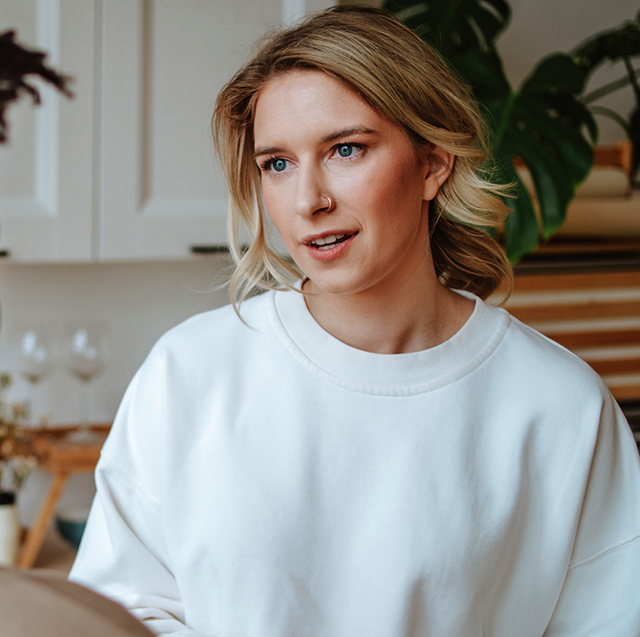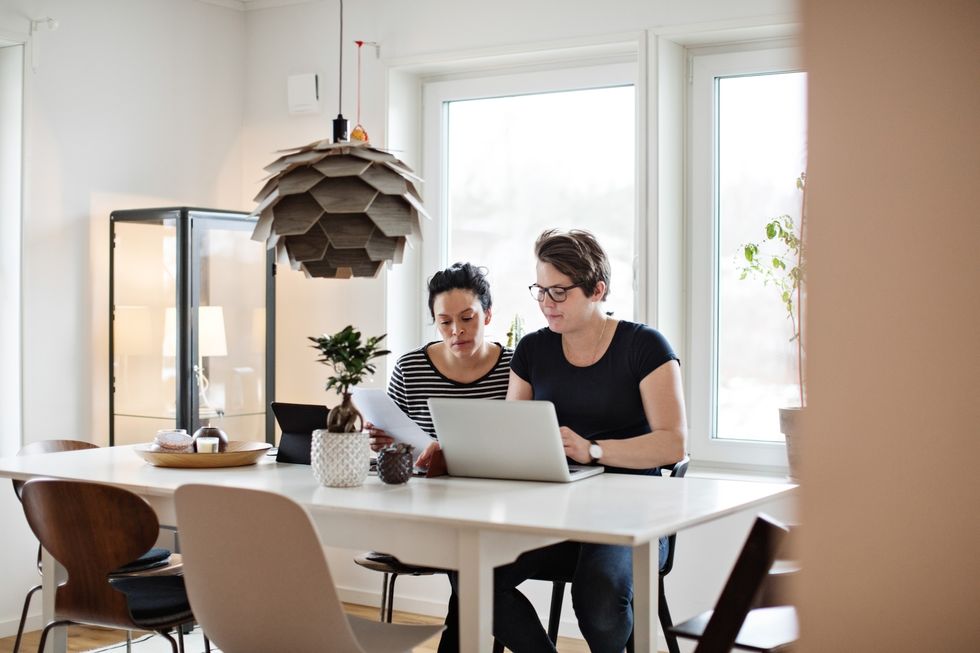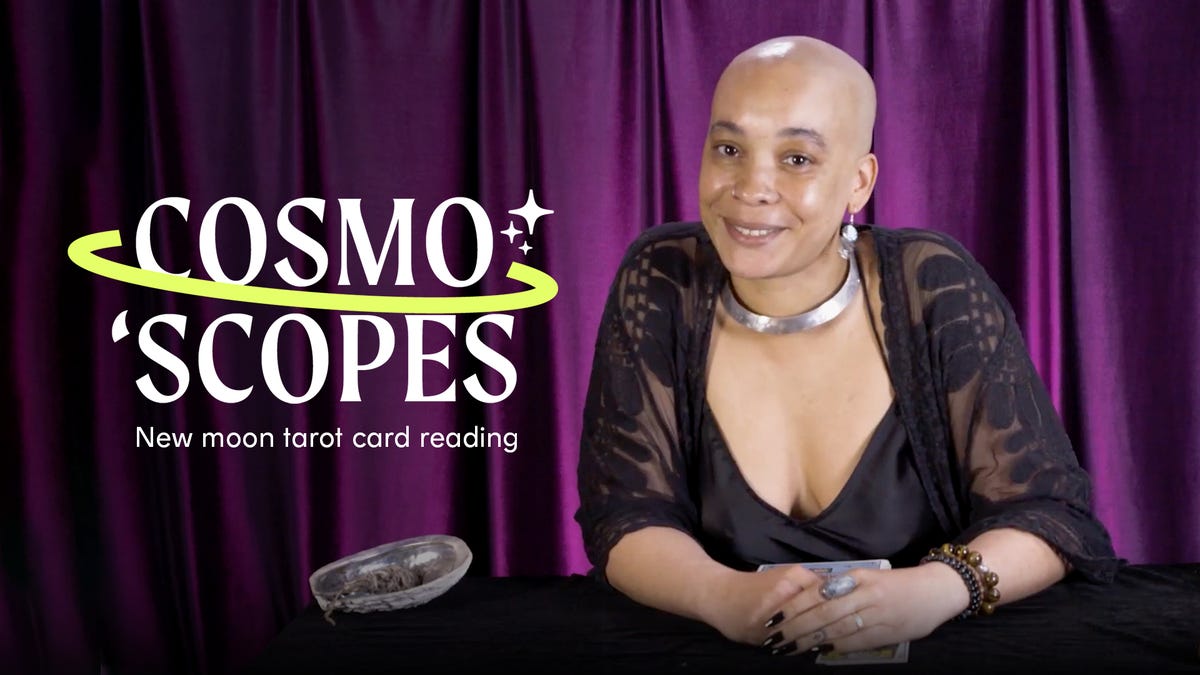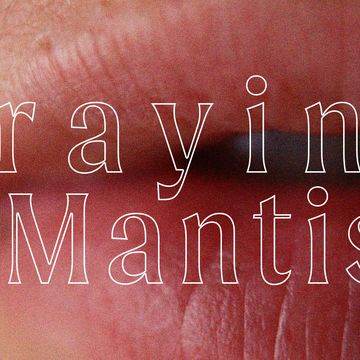Rachel met her partner Oli at a house party when they were 15, during the era when you could play Rizzle Kicks through your iPod speakers and people would dance unironically. They continued dating throughout college, and then university - where they spent five years doing long distance. After graduating, they spent a year riding out Covid at Oli’s dad’s house, and decided they wanted to buy a house together.
“Once we really started looking to buy our first house, we realised we should really have a joint bank account to pay all up-coming house-buying bills, plus to share the household bills, once we did eventually move,” Rachel tells Cosmopolitan UK, but this meant deciding how to structure their finances. For Rachel, who grew up with a single mum and “no money to spare”, it was important to have her own money and budget.
While merging finances was traditionally considered a show of commitment and longevity, 51% of couples no longer share a joint account according to a survey from F&C Investment Trust - with younger couples being less likely to do so. On top of that, one in 10 now do not share a joint savings account, even if they have the same long-term goals.
With the cost-of-living crisis putting a squeeze on us all, money is becoming an increasing point of contention in many relationships. For women, there often comes added monetary worries - women are still paid less than men and tend to come out of breakups financially worse off than their male counterparts, so having a separate bank account or pot of money, sometimes called a ‘get the fuck out fund’ (GTFO) fund, can be a vital lifeline for women when a relationship ends.
A ‘GTFO’ is just that - a fund to help you get out, in a hurry if you need to. Unlike your savings, it’s a smaller pot of cash you put aside to help you make your exit - so it needs to be easily accessible. These kinds of funds, sometimes called Go Funds, have their roots in a time when women couldn't have their own bank accounts, so would put aside cash for if they ever need to flee their partner. Today, charities like Women’s Aid still recommend having a GTFO fund; “Emergency funds are desperately needed by those seeking to leave their abusers, especially now, given the additional challenges presented by the cost-of-living crisis,” explains Farah Nazeer, the charity’s Chief executive.
But, GTFO funds aren’t just important for women experiencing abuse or coercive control; having a separate fund of money can be just as important in healthy relationships - and healthy break ups. While marriage acts as legal protection, guaranteeing you at least a portion of your assets when you divorce, that is a notoriously long process. Having your own account can help you get back on your feet in the meantime. Plus, if you and your partner aren’t married, you aren’t legally entitled to split any assets. The myth of the common law marriage is just that – there is no such thing; no matter how long you’ve been together or even lived together, you’re still single in the eyes of the law if you haven’t gotten hitched. With new data from Monzo revealing that 65% of couples have said the cost-of-living crisis has got them arguing about finances more than ever, now might be the perfect time to organise your GTFO fund, including talking to your partner about it. Especially as almost half of those surveyed by Monzo said they’d lied to their partner about money - perhaps contributing to those arguments.
“Having an emergency fund is one way many people try to protect themselves by ensuring some financial security and freedom,” says Pearl Akintola, consumer finance expert at Experian. “If this is something you’re considering, it’s important to be realistic about how much you would need and to start saving from the beginning of your relationship, rather than only when things start to go wrong. It might help to keep a flexible perspective on what the fund is for because if things go well those savings could pay for a wedding or mortgage and if they don’t go well then, you’ve got your GTFO fund.”
The first step, she says, is to set up an account “an account that you can withdraw money from immediately, and that your partner does not have access to.” Pearl advises keeping your emergency fund liquid. “An easy access savings account with high interest could be a good option – it could yield higher interest on your savings, but still be available straight away,” she says.
Although it’s safer to keep your partner off of your account, that doesn’t mean you have to keep it secret. “Fundamentally, it’s about transparency,” says Tamara Hoyton, a relationship therapist with Relate, about how to discuss wanting separate accounts with your partner. “Even if you’re in a relationship, you still have a right to be you. There’s a part of you that is still going to be an individual,” she explains, adding that separate finances can help you maintain your independence - which can even benefit your relationship. “It’s exciting if there are [parts of your life] that are separate. You're a more interesting person if I don't know everything about you,” she says. After all, your partner knowing exactly how much a month you spend on Pret might not be the sexiest thing in the world.
It can also act as a buffer for other arguments about spending, which Hoyton says she is increasingly seeing in her practice as the price of goods continues to rise. For Rachel and Oli, this means paying into a joint account which covers their bills and groceries, plus a little extra for joint activities, while the rest of their money stays in their personal accounts for all the bits and bobs they feel the other shouldn’t have to pay for. “The rest I can either spend or save on my own personal fun stuff with no guilt that I’m spending his money, and vice versa,” says Rachel.
The couple never sat down to have one big conversation about how to structure their finances, instead re-evaluating each time they made a decision as a couple (like whether or not to move in together), which Hoyton agrees is a good approach. “If [you] start moving in together, presumably you're both going to split the mortgage or rent. So a good time to talk about it is before then. You know, what are your expectations, what are my expectations in terms of how you’re going to split money?” For some couples, Like Rachel and Oli, there is an expectation that all joint finances will be split 50/50, whereas others may prefer to divide costs based on their earnings. “It’s all subjective to the couple,” says Hoyton.
While it’s not necessarily a red flag if your partner initially reacts badly to the idea of you having a separate account, Hoyton says it can be a sign of fundamental difference between you and your partner that “needs talking through.” To do so, she suggests asking your partner what the separate account represents to them. Whereas a separate account for you might represent security, independence, and still being able to surprise them with presents, for your partner, it could bring up feelings of insecurity and abandonment. Once you understand that the conversation may be more about priorities than money, you can try to find a resolution.
“Even though we’ve been together for yonks, it’s really important to me as a woman to have a back-up plan. I want to know I can live independently without relying on my spouse,” says Rachel, adding that she would have been “really shocked” if Oli wasn’t comfortable with it, which is why it was so important for her to have the conversation early on in the relationship. “If you haven’t built a relationship to that level of communication, I think you’ve got some work to do before you start pooling anything as important as money.
“If that person isn’t willing to have frank conversations about this kind of stuff, then perhaps they’re not the sort of person you want to be trusting with half your money anyways!”















